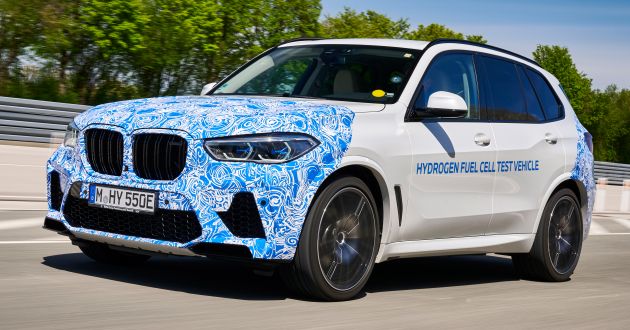BMW i Hydrogen NEXT – FCEV begins real-world tests
After several years of preparing the BMW i Hydrogen NEXT, BMW will finally begin testing a fleet of near-standard hydrogen fuel cell electric vehicles (FCEV) in everyday conditions on European roads.
The Bavarian automaker will examine how effectively the CO2-free drivetrain, model-specific chassis technology and vehicle electronics systems work together under real-world conditions. As you can tell, the prototype vehicle is based on the G05 X5, and BMW plans to release it as a small-series model in late 2022.
For those who are unfamiliar with a fuel cell electric vehicle, it is essentially a fully electric car that gets its power by mixing hydrogen with oxygen. In the i Hydrogen NEXT, this chemical reaction generates 125 kW (170 PS) of power, all of which is sent to an electric motor after going through a series of voltage regulation.
Energy that is not used gets stored in a performance buffer battery (much smaller and lighter compared to a battery-electric vehicle) that provides short bursts of speed for overtaking. At this stage, the total system output is 275 kW, or 374 PS. The battery is not the primary source of energy required for propulsion. Hydrogen is.
Like the fuel tank of a regular car model, the hydrogen tank of the BMW i Hydrogen NEXT can also be refueled within three to four minutes, and a single pump almost guarantees a range of several hundred kilometres regardless of weather condition.
But unlike a regular car’s fuel tank, a fuel cell vehicle stores hydrogen in highly pressurised tanks. In the case of the i Hydrogen NEXT, it has twin 700-bar tanks made from lightweight carbon-fibre reinforced plastic, capable of storing 6 kg of hydrogen. Water vapour is the only emission produced by this drivetrain.


BMW says hydrogen fuel cell technology has the long-term potential to supplement internal combustion engines, plug-in hybrid systems and battery-electric vehicles (BEV). It can be an attractive alternative to BEVs for customers who don’t have access to a charging network, or for those who frequently drive long distances. Jaguar Land Rover also echoes this sentiment.
“Hydrogen fuel cell technology can be an attractive option for sustainable drivetrains – especially in larger vehicle classes,” according to Frank Weber, BMW board member responsible for development. “That is why road testing of near-standard vehicles with a hydrogen fuel cell drive train is an important milestone in our research and development efforts.”
The extensive road testing will help development engineers validate the efficiency, safety, convenience and reliability of all components. It is also for BMW to finetune the driving characteristics of the car, because a BMW should still drive like a BMW, no matter what the source of propulsion is. In case you forgot, the fuel cell system in this i Hydrogen NEXT is the result of a long-term partnership between BMW and Toyota.




















The post BMW i Hydrogen NEXT – FCEV begins real-world tests appeared first on Paul Tan's Automotive News.
from Paul Tan's Automotive News
Read The Rest:paultan...




Post a Comment